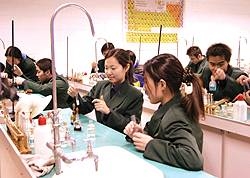题目内容
YOU may like chewing gum (口香糖) after meals to stop your breath smelling bad; or your mother might use a special neutralizer (调理剂) to protect her permed hair (烫发). But have you thought about the chemical principles behind such everyday actions?
On March 2, the Senior 3 students from the IB (International Baccalaureate, 国际文凭) classes at Beijing Huijia Private School presented their discoveries, all in fluent English. This kind of seminar is held every year to show the achievements of the IB chemistry experiment lessons offered by the school. IB is a qualification based on a common curriculum (课程) for students aged 16-18 in any country and is recognized by universities everywhere.

"Once I saw an advertisement for xylitol (木糖醇) gum," recalled Zhang Xinju. "Suddenly an idea came to my mind: are there any chemical reactions when the xylitol is working on our teeth?"
Zhang and his partner Bu Xuan visited several hospitals to try and find out. "Doctors know that xylitol can protect teeth, but few could explain how the chemical reactions happen," said the 17-year-old boy.
Presenting the results of their research in English to an audience of Chinese and foreign judges was never a problem for the students.
"Textbooks for IB students are in English, and our teachers speak in English," explained Wei Duan and Han Yu, whose research topic was "The Acid-Base Reaction (酸碱反应) in the process of Hair-Perming".
"In Senior 1 we often referred to Chinese textbooks, but we found we could understand and express it all in English by the second year."
Lu Jiang, the school's IB chemistry teacher and China's only IB vice-examiner, is proud that her students can apply scientific theories they learn in class to daily life.
"You might have learned these facts from you kindergarten teachers, but few think about the theories behind them," Lu said. "This kind of practice is intended to develop the scientific thinking they will need in their future studies."
1.IB is recognized by____________.
A.Beijing Huijia Private School
B.univercities in China
C.schools in Engkish-speaking countries
D.universities in any country
2.which statement is true?____________
A.Doctors don’t know that xylitol can protect teeth
B.Doctors can explain how the chemical reactions happen
C.Few could explain how the chemical reactions happen.
D.The foreign doctors can explain how the chemical reactions happen
3.Textbooks for IB students are in___________
A.Chinese B.English
C.English and Chinese D.Japanese
4.From the passage,we know_______
A.the students are creative
B.the students are poor in Chinese
C.the students don’t like chewing gum
D.The students are hard-working
5.From the passage,we can infer _________________________
A.we only need to work hard in our study
B.we must learn English well
C.we should intend to develop the scientific thinking in our studies
D.we should have more time to play

